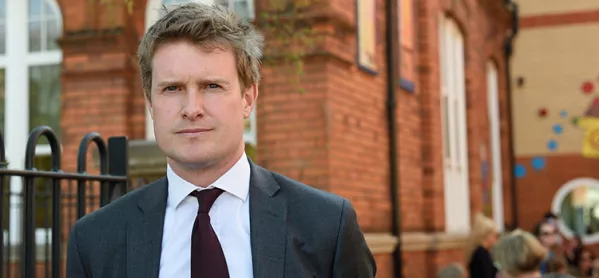Young children need to express their creativity - with play, not cramming, in the early years - Tristram Hunt, director of the V&A, has said.
Mr Hunt, a former Labour shadow education secretary, added that nurturing children’s imagination, ingenuity and creativity should continue throughout their schooling.
Speaking to the Tes before the V&A unveiled its plans to redevelop the V&A Museum of Childhood in East London, Mr Hunt talked about his concern at the decline in art and design subjects in schools.
“Our message for the Museum of Childhood is about the wonder of play, imagination and creativity - put down the flashcards and Kumon and the cramming,” he said.
“We know that play teaches resilience and things like character, judgement, collaboration, role-playing, imagination and making. All of those, particularly in the early years, are incredibly important for the development of children.”
The proposals for the changes at the Museum of Childhood have been developed in collaboration with schoolchildren at the nearby Globe and Bangabandhu primary schools.
‘Boosting the value of creative subjects’
Mr Hunt’s comments come after Darren Henley, chief executive of the Arts Council England, said he believed that creativity was as important as literacy and numeracy in providing a great education.
There has been growing concern about the narrowing of the school curriculum - a Tes analysis of government data revealed that maths, English and science now take up more than half of teaching time for 14- to 16-year-olds, and that less time is spent on music, art and drama throughout secondary schools than in 2011.
Among the subjects which have suffered most in recent years is design and technology - which had 40 per cent fewer teaching hours in Key Stage 4 in 2017 than in 2011.
Mr Hunt said the V&A was working to boost “the prestige and value” of D&T and creative subjects in general.
“The D&T teachers of the future aren’t necessarily thinking it’s a career for them, if schools aren’t going to be teaching it,” he said.
“We now have a real challenge in teacher recruitment and a particular challenge in art and design subjects, and so what are we doing? We’re working to raise the prestige and value of the subject and we’re also supporting the professional development of teachers currently working in D&T to make sure they don’t drop out of the system.”
He added that England had already got a strong creative sector and schools were part of that.
“We’ve heard a very strong drumbeat about Stem, Singapore maths and the three sciences and all of that is important,” Mr Hunt said. “But we’re very good at creativity and design in this country. Our schools teach it very well when they are given the space to do so, so why seek to undermine a source of national competitiveness?”
A DfE spokesperson said: “We take the study of the arts extremely seriously, which is why music and art remain compulsory parts of the national curriculum up to age 14. Since 2010, we’ve seen that the proportion of young people taking at least one arts GCSE has remained broadly stable.
“We invest heavily in arts and music subjects, with more money going into education programmes to support them than anything else aside from PE; this includes nearly half a billion pounds to fund a range of music and cultural programmes. We also offer strong financial incentives for people looking to enter the teaching profession, such as bursaries of up to £12,000 in design & technology trainee teachers.”




